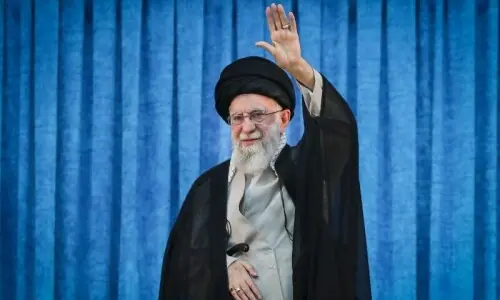LAST week, a comment in the Pakistani press headlined ‘Robin Raphel: the female Philby?’ gave the initial impression that the American diplomat was being compared with the man who for years fed a steady stream of Western secrets to Moscow. That wasn’t the writer’s intention, though. The parallel he had in mind was with St John Philby rather than his considerably more notorious son, based on the fact that the British agent, stationed in Mesopotamia and Palestine as an employee of the Indian Civil Service in the early 20th century, switched allegiances mid-career.
He wasn’t particularly surreptitious about it, though, given that he became a key adviser to King Ibn Saud without being viewed as a traitor in London. He remained sufficiently well connected, in fact, to facilitate his son’s entry into MI6.
St John, who counted Jawaharlal Nehru among his friends at Cambridge, had by then converted to Islam and taken on the name Sheikh Abdullah. He later married, and had children with a Baloch woman described as a gift from his patron. His first son, though, was born in 1912 in Ambala, and nicknamed Kim after the Rudyard Kipling character. The latter’s most recent biographer, British journalist Ben Macintyre, suggests that the first language young Kim picked up was Punjabi.
Macintyre’s bestselling book, A Spy Among Friends: Kim Philby and the Great Betrayal, testifies to a continued fascination with the highest-level Soviet mole to have penetrated Western intelligence more than 50 years after he defected to the USSR.
The nature of the smoking gun is a remarkable aspect of the Philby tale.
Philby was head of MI6 in Washington — and a serious contender for the top job at the agency’s headquarters — when he was summoned back to London after Donald Maclean and Guy Burgess defected to Moscow in 1951, suspected of having warned them that Maclean had been outed as a spy. He was obliged to resign his post and subjected to hostile interrogations by MI5, but retained the support of most of his colleagues at MI6.
His stoutest defenders included his close friends Nicholas Elliott, a fellow senior official in MI6, and James Jesus Angleton, a rising star at the CIA who went on to become the agency’s counter-intelligence chief. Angleton and Philby had met every week for long, substantially liquid lunches during the latter’s sojourn in Washington.
The CIA files relating to these encounters disappeared after Philby defected. Angleton subsequently claimed to long have suspected Philby, but in fact he shared with him countless secrets that promptly found their way to the KGB — and his paranoid determination, after Philby’s defection in 1963, to embark on a mole-hunt within the CIA did lasting damage to the agency.
Back in the 1950s, no conclusive evidence could be found against Philby — he was effectively rehabilitated after foreign secretary Harold Macmillan declared in parliament that Philby wasn’t “the third man”. Appointed as a Middle East correspondent by The Economist and The Observer, he was also back on the MI6 payroll — and, once based in Beirut, re-established contact with the Soviets.
The nature of the smoking gun that eventually emerged is one of the more remarkable aspects of the Philby tale. It took the shape of Flora Solomon, a friend from Cambridge whom he had once attempted to recruit as a spy. By the early 1960s, she was a committed Zionist and considered Philby’s articles in The Observer anti-Israel, which led her to conclude he had remained a communist all along. She mentioned this to an acquaintance with MI5 links — and the apparent evidence of Philby’s links with Soviet intelligence set the ball rolling once more.
An infuriated Elliott, finally convinced of his friend’s treachery, decided to confront him personally in Beirut in late 1962; the idea, however, was not to bring him to trial, but to offer him immunity in exchange for a full confession. The British establishment was keen to avoid a scandal — and equally determined to give the Americans the impression that Philby’s espionage had ceased before his appointment to Washington.
No effort was made during or after Elliott’s interrogation to keep an eye on Philby, who was on his way to Moscow within days —- and, according to Macintyre, eventually accepted that this is precisely what MI6 wanted him to do. Among the old-boy network of which he had been a part for so long, there was bewilderment, hurt and anger — but also grudging admiration.
His relatively easy ‘escape’ meant some in the KGB initially suspected Philby to be working for British intelligence after all — but when he died 25 years later, he was buried with full military honours.
As the cold war between Russia and the West revs up once more, there will no doubt be plenty more episodes of spy vs spy — but in all likelihood not as extraordinary as the saga of Harold ‘Kim’ Philby.
Published in Dawn, November 19th , 2014





























